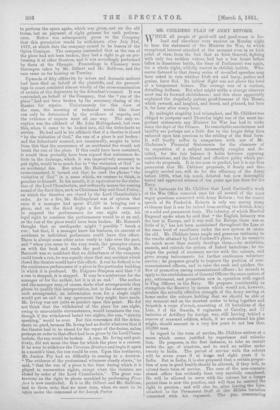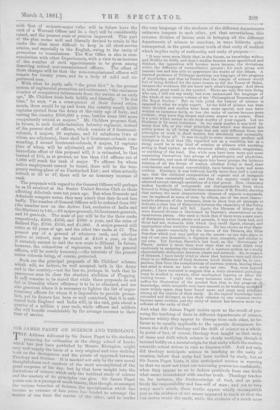MR, CHILDERS' PLAN OF ARMY REFORM.
IATErLE all people of good-will and good-sense in Ire- land and elsewhere were anxious on Monday night to hear the statement of the Minister for War, to which exceptional interest attached at the moment oven in an Irish point of view, from the fact that an Irish General, fighting with only too reckless valour, had but a few hours before fallen in disastrous battle, the time of Parliament was again, for a whole night, wilfully wasted in childish babble. Who- soever listened to that dreary series of so-called speeches may have asked in vain whither Irish wit and fancy, pathos and genius, have fled. Its loftiest flight was not above the level of a temperance lecture. The average was of a curious, drivelling dullness. But what might strike a strange observer most was its froward childishness ; and this alone apparently explained the singularly patient good-humour of the House, which yawned, and laughed, and dozed, and grinned, but bore it, for hour after weary hour.
By midnight stupidity had triumphed, and Mr. Childers was obliged to postpone until Thursday night one of the most im- portant statements any Minister for War has had to make since the days of the Crimea. Its remarkable succinctness and lucidity are perhaps not a little due to the longer delay thus enforced upon him previous to the settling of the final form. It will hardly suffer in comparison with one of Mr. Gladstone's Financial Statements for the clearness of its exposition of a subject necessarily complex and de- tailed, for the fair balance it holds between opposing considerations, and the liberal and effective policy which per- vades its proposals. It is too soon to predict, but it is our firm persuasion that Mr. Childers' proposals if firmly and tho- roughly carried out, will do for the efficiency of the Army before 1890, what his much debated but now thoroughly tested and approved scheme of ton years ago has done for the Navy.
It is fortunate for Mr. Childers that Lord Cardwell's work at the War Office removed once for all several of the most angry questions connected with Army Reform ; but the recent speech of Sir Frederick Roberts is only one among many evidences that it was far indeed from settling the British Army on a solid and permanent basis. The infantry, of which Marshal Bugeaud spoke when he said that "the English Infantry was the best in Europe, and it was well for Europe there was so little of it," has not been maintained throughout the Line at the same level of excellence under the new system as under the old. Mr. Childers bears ample and generous testimony to the results attained by Lord Cardwell's plans ; but he essays to do much more than merely develope them,—he maintains, amends, and extends the system of linked battalions ; he en- larges the period of necessary service with the colours, and gives strong inducements for further continuous voluntary service ; he proposes greatly to improve the position of non- commissioned officers, and to raise the rank and quicken the flow of promotion among commissioned officers ; he intends to apply to the establishment of General Officers the same system of pay, retirement, and promotion now in operation with regard to Flag Officers in the Navy. He proposes considerably to strengthen the Reserve by means which would not, however, weaken the actually effective strength of the Army serving at home under the colours, holding that we should be able at any moment and on the shortest notice to bring together and despatch a corps d'arrnee, consisting of 18 battalions of the Line, 3 of the Guards, 6 regiments of Cavalry, and 17 batteries of Artillery for foreign war, still leaving behind a reserve of seasoned soldiers, which, if we understand his plan aright, should amount in a very few years to not less than 50,000 men.
In regard to the term of service, Mr. Childers arrives at a mean which seems justified by experience and calcula- tion. He proposes, in the first instance, to take no recruit under the age of nineteen, and to send no soldier under twenty to India. The period of service with the colours will be seven years if at home, and eight years if in India. But in India, it is also proposed that a certain propor- tion of men in good health should be allowed, if they will, to extend their term of service, The case of the non-commis- sioned officer has evidently been very carefully considered. He will be allowed to serve with the colours for a longer period than is now the practice, and will thus be assured the right to pension ; and will also be, after leaving the Line, attached to the Permanent Staff of the Militia battalion connected with his regiment. The pay, commencing with that of serjeant-major (who will in future have the rank of a Warrant Officer and 5s. a day) will be considerably raised, and the present scale of pension improved. This part of the plan seems well and liberally devised to retain in the ranks the class most difficult to keep in all short-service armies, and especially in the English, owing to the rarity of promotion to commissions. The War Office is also in com- munication with other Departments, with a view to an increase of the number of civil appointments to be given among deserving retired non-commissioned officers. The effect of these changes will be that the non-commissioned officers will remain for twenty years, and be a body of solid and ex- perienced men.
With what. he justly calls " the great blot" in the present system of regimental promotion and retirement, "the enormous number of compulsory retirements from the service at an early age," Mr. Childers deals both boldly and liberally. "In due time," he says, "as a consequence of their forced retire- ments, there would be up and down the country nearly 4,500 captains ejected from the Army at the early age of forty, and costing the country £900,000 a year, besides some 500 more compulsorily retired, as majors." Mr. Childers proposes that, in future, in each double-battalion Infantry regiment, instead of the present staff of officers, which consists of 2 lieutenant- colonels, 4 majors, 29 captains, and 34 subalterns (two of whom are adjutants), there shall be 2 lieutenant-colonels com- manding, 2 second lieutenant-colonels, 8 majors, 12 captains (two of whom will be adjutants), and 30 subalterns. The immediate effect of this proposal will, it is estimated, ho that instead of 216, as at present, no less than 516 officers out of 1,000 will reach the rank of major. To officers for whom active employment cannot be found, there will be the tem- porary resting-place of an Unattached List ; and when actually retired, at 43 or 47, there will be an honorary increase of rank.
The proposals with regard to the General Officers will perhaps be as ill received at the Senior United Service Olub as those affecting Admirals were ton years ago. But when Generals and Admirals compare notes, they may admit that they do not fare badly. The number of General Officers will be reduced from 387 (the number now on the Active List, exclusive of India and the Marines) to 140,-95 major-generals, 35 lieutenant-generals, and 10 generals. The scale of pay will be for the three ranks respectively, £500, £650, and £800 a year, and the rates of Retired Pay, £700, £850, and £1,000. A major-general will retire at 62 years of age, and the other two ranks at 67. The present pay of a general of whatever rank, and whether active or retired, may be stated at £450 a year, so that it certainly cannot be said the new scale is illiberal. In future, however, the coloneleies of regiments, now held by general officers, will be merely honorary,—the interests of the present senior colonels being, of course, protected.
Such are the principal proposals of Mr. Childers' scheme, which will, we believe, be well accepted, both in the Army and in the country,---not the less so, perhaps, in both that he announces near its close the absolute abolition of Flogging. It only remains to be stated that while these proposals do not fail in liberality where efficiency is to be so obtained, and are also generous where it is necessary to lighten the list of super- numerary officers for whom it is impossible to provide promo- tion, yet its finance has been so well contrived, that it is esti- mated both England and India will, in the end, gain about a quarter of a million a year each, while officers and soldiers also will benefit considerably by the average increase to their time of service.



































 Previous page
Previous page